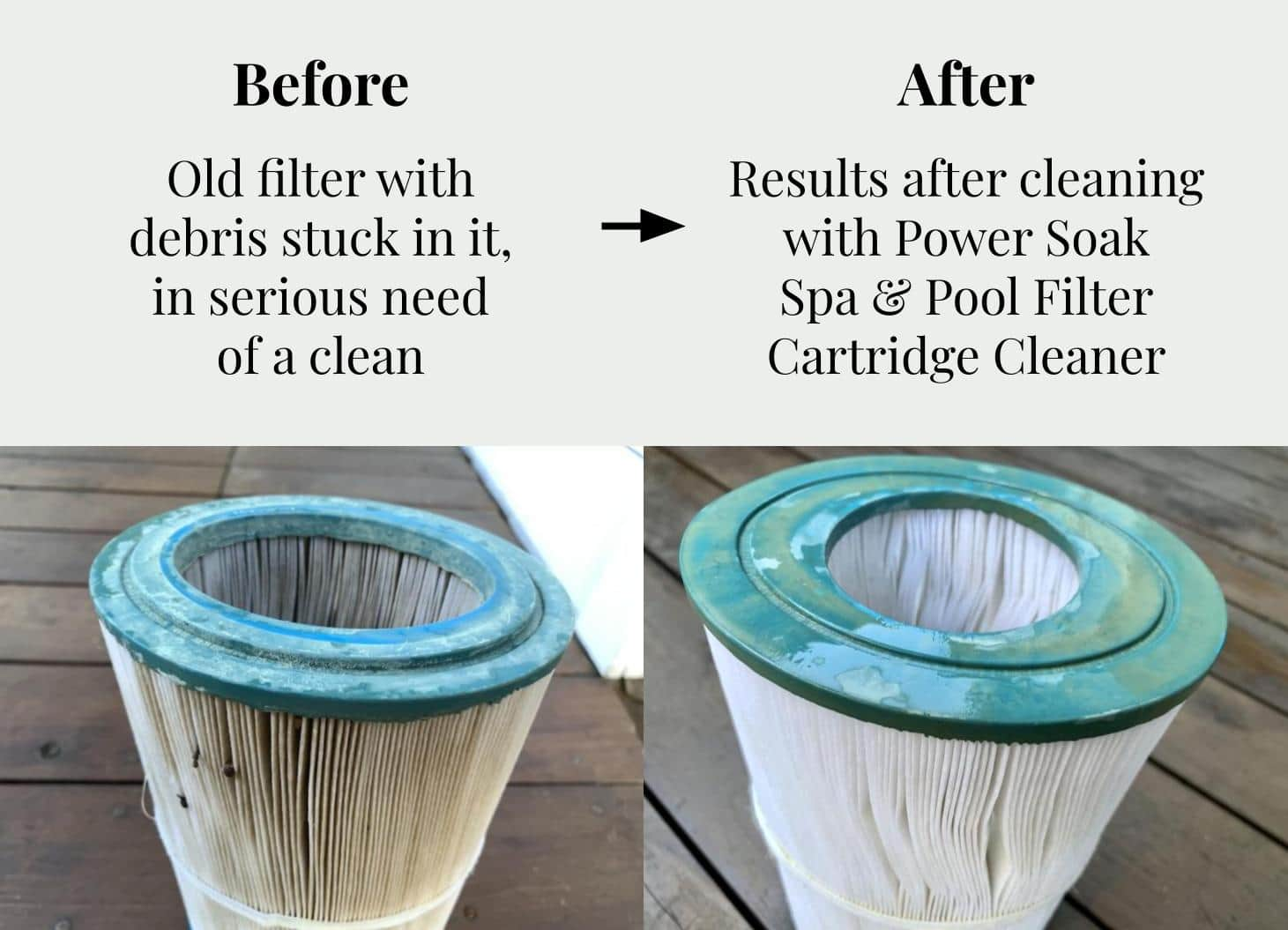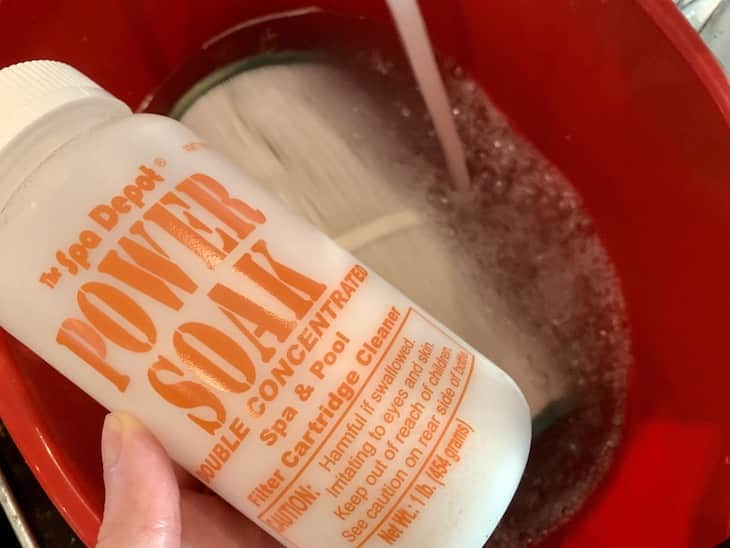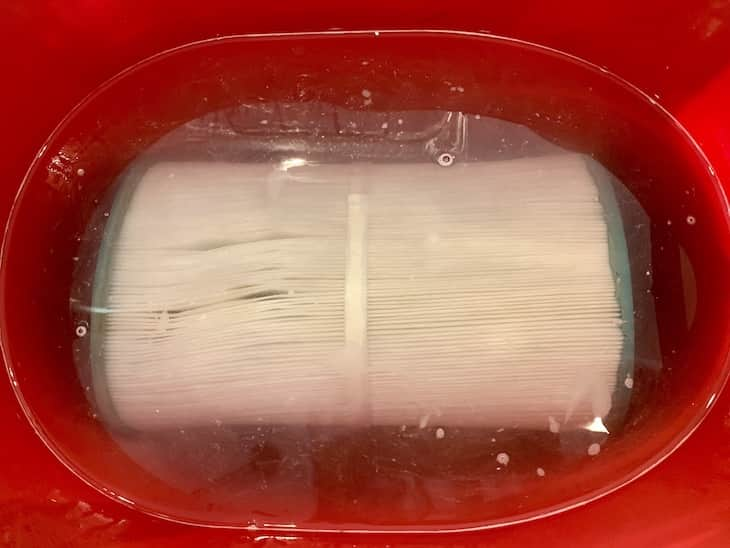The Best Hot Tub Filter Cleaner (and How to Use It)
As an Amazon Associate I earn from qualifying purchases.
When we use our hot tubs, grime gets in too. Whether it's body oils or lotions, debris from nearby plants, or dirt from the ground, your filter's job is to catch these unwelcome contaminants—and stop them getting sucked into your spa's mechanical parts.
As you might imagine, this build-up inside the filter's pleats eventually needs to be cleaned out, or it's going to turn your sparkling clean spa into a swamp.
What is the best hot tub filter cleaner?
Based on my own experience, the best deep filter cleaner is this Power Soak Spa & Pool Filter Cartridge Cleaner (link is for the 2-pack I buy on Amazon).
So how does it work? From the manufacturer:
Removes lotion residues, body oils, dirt & grime. Improved double-strength formula now also contains enzymes for added cleaning power to devour organic contaminants.
It lasts for ages so is great value, and it really does get my filters looking like new again:

The water you soak it in turns black from all the grime—even if the filter looked clean before!
How do you clean hot tub filters?
There are a few different ways to clean a hot tub filter:
- Rinsing with water: This can remove large debris and make your filter look a lot cleaner, but won't actually clean the small particles and build-up settled in the fibers.
- Using a spray cleaner: Sprays like Leisure Time Instant Cartridge Cleaner are quick and easy to use, and will get your filter cleaner than just water.
- Soaking with a powder cleaner: For the deepest clean, you need to submerge the filter in a cleaning solution to really reach inside all the pleats.
How to use Power Soak filter cleaner
Rinse your filter with a high-pressure garden hose at a 45° angle. This will remove large debris and get your filter looking a lot cleaner. If it was starting to turn brown or green, this color should start to lift.
Dissolve 1/2 cup (about 4 heaping capfuls) of Power Soak in a large bucket of water. Hot or cold is fine, but hot works best in my experience.

Leave your filter to soak in the bucket. It needs at least an hour if you used hot water, or overnight if you used cold. I use hot water and still leave it overnight. Don't worry—you won't damage the filter by leaving it for longer.

Remove the filter from the bucket and rinse it thoroughly. This step is important. If you don't rinse it properly, leftover detergent could cause foaming in your hot tub or interfere with the water chemistry.
How often should you clean hot tub filters?
The best approach is to combine the different filter cleaning methods into a schedule like this:
| Task | Frequency |
|---|---|
| Rinse with garden hose and optional filter cleaning spray | Every 2-4 weeks |
| Deep clean with filter soak | Every 3-4 months (more if your spa has heavy usage) |
| Replace filter | Yearly |
This way, you can do a quick rinse every couple of weeks to prevent your filter from getting too clogged, and save the deep clean for when you do a full drain and refill (since you're already doing more work at this point anyway).
Keep a spare set of filters so you always have a new set to swap in. This way, your spa never has to be left without a filter while you're leaving the dirty one(s) to soak.
Do I actually need to use filter cleaner?
You might think that a quick rinse is all you need to keep your spa filter clean.
The problem is that rinsing with water alone will not remove oily substances. Even though filters might look clean after a rinse, there will still be oils, lotions and other water-insoluble particles coating the fibers.
This invisible build-up will clog your filter over time and prevent it from working as well as it should. Less water will be able to flow through it, and more contaminants could be left in the water.
To remove these layers of material stuck to the pleats of your filter, you need a cleaner that can break down oils—just like you use a shampoo to properly clean your hair—before you can properly rinse them away.
Can I clean my hot tub filter with vinegar?
You can use white vinegar like this Heinz one to clean a spa filter.
To clean your filter with vinegar:
- Rinse the filter to remove any large debris
- Make a 50/50 water to vinegar solution in a large bucket
- Add the filter and soak for 2 hours
If you're looking for a natural way to clean hot tub filters, vinegar can be a good option.
It will act as a disinfectant and can destroy some bacteria, but it will be less effective than a commercial filter soak. It's also not a surfactant, which means it can't break down grease or oils in the same way that soaps and detergents can.
So if your filter is very dirty, you'll need to either use a more powerful cleaner, or buy a new filter.
You can prolong the life of your filter by minimizing the contaminants that get in the water. Always shower before using the spa to remove sunscreens, lotions or deodorants, and be careful not to bring in any dirt on your feet.
Can I soak my hot tub filter in bleach?
You should never soak your spa filter in a bleach solution.
Bleach is simply too harsh for the fibers of hot tub filters, so although it's powerful enough to kill bacteria, it's also likely to damage your filter.
While you might think you're saving money, you'll have to replace your filter more often if you clean it with bleach—and filters are more expensive than filter cleaner.
The best option here is really just to use a proper filter cleaner like Power Soak.
If you're looking for a natural option, you can use white cleaning vinegar instead, though bear in mind it won't clean quite as well.
Can I clean my spa filter in the dishwasher?
You should not clean hot tub filters in the dishwasher.
I know it might seem tempting, but dishwashers get very hot, and their detergent is harsh. It's designed for kitchenware—not the delicate fabric of hot tub filters.
Not only can dishwashers damage the fibers or the structural integrity of your filter (meaning it will not last as long), but you also risk the filter not doing as good a job of filtering oils and debris in the future.
An ineffective filter can put your spa at risk by letting contaminants get sucked into its inner components.


